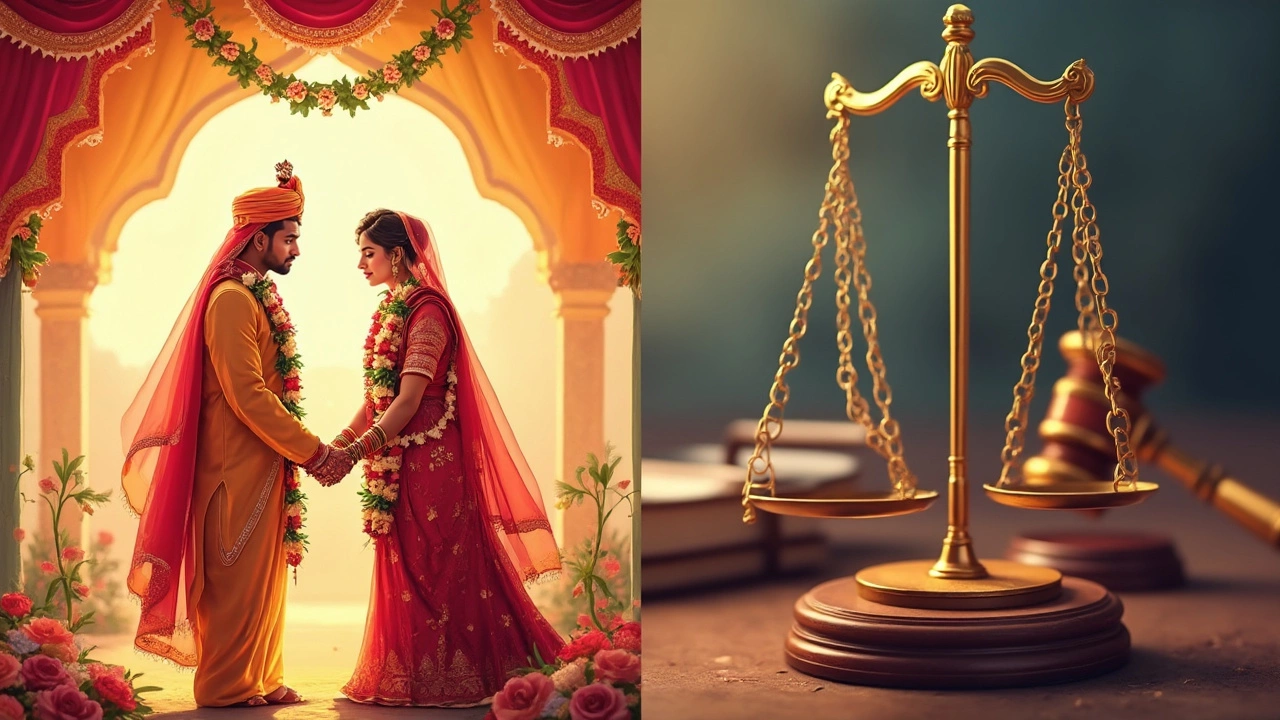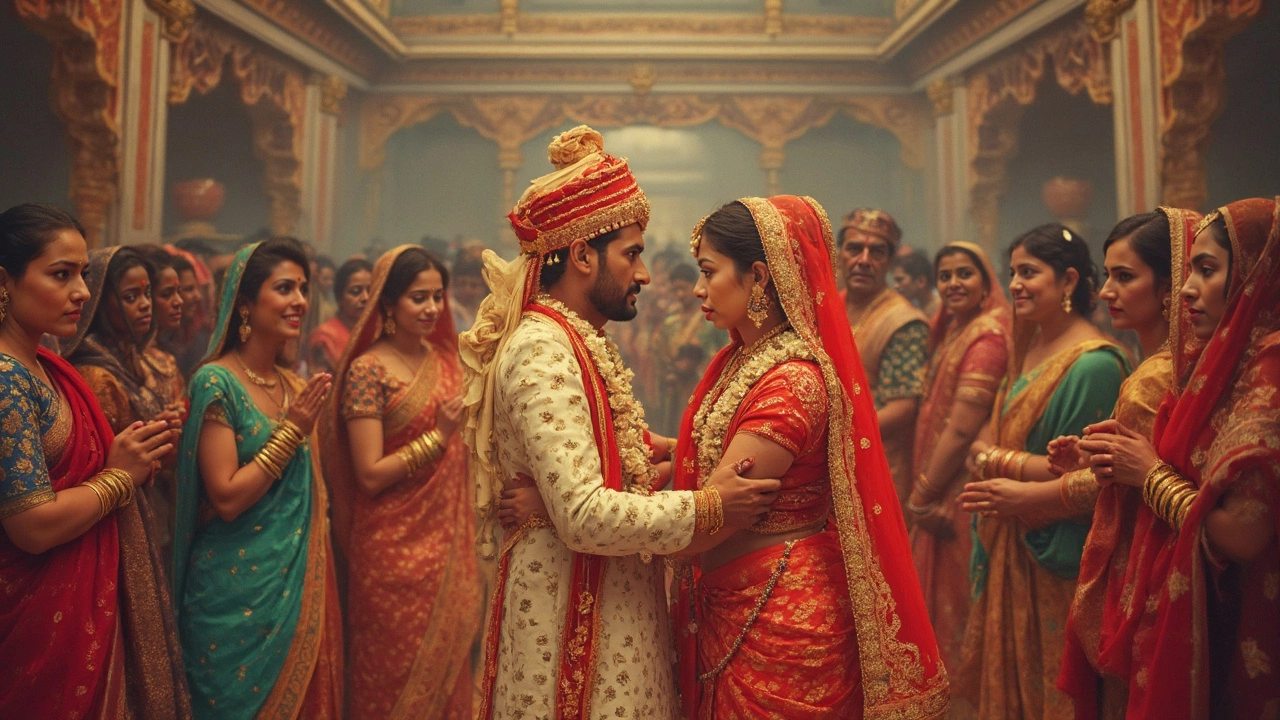Ever wondered what really makes a marriage invalid in India? It's a bit more complex than just saying 'I do.' Indian marriage laws have their specifics, and if you're thinking of tying the knot there—or maybe you're just curious—understanding these rules can be pretty important.
First off, the legal age is a biggie. For a marriage to be valid in India, the groom must be at least 21 years old, and the bride 18. If either party is underage, guess what? That can invalidate the whole deal. So, double-check those birthday certificates!
Then comes consent and mental capacity. It's not just about saying yes; it’s about knowing and understanding what you're agreeing to. If one person isn't mentally capable of giving genuine consent or is doing so under pressure or deceit, that's grounds for invalidation. So, free will isn't just a nice-to-have—it’s a must.
- Legal Age Requirement
- Consent and Mental Capacity
- Prohibited Relationships
- Fraud and Coercion
- Registration Requirements
Legal Age Requirement
In India, getting hitched before hitting certain age milestones is a no-go, legally speaking. The legal age requirement is one of the key factors that can make or break the validity of a marriage. According to Indian law, the groom must be at least 21 years old, while the bride should be no younger than 18. If either party falls short of these ages, the marriage is considered void.
The reasoning behind these age limits is pretty straightforward. It's about ensuring that both individuals are mature enough to make such a significant life decision. Premature marriages can lead to a whole host of issues, and the law aims to prevent those.
"The objective is to ensure mental and physical maturity in individuals entering matrimony," says a senior official from the Ministry of Women and Child Development.
This rule isn’t just old school tradition; it’s enshrined in the Prohibition of Child Marriage Act of 2006, which prohibits marriages involving minors. Official data over the years has shown a gradual decline in child marriages due to these legal stipulations.
For those taking the plunge in India, it’s not just about love but also about legality. Checking those birth certificates is as crucial as saying ‘I do.’ Without meeting these age requirements, all the wedding festivities could be in vain, as the marriage might not hold up legally. So, before planning the big day, make sure the legal boxes are ticked.
Consent and Mental Capacity
When it comes to marriage in India, both consent and mental capacity are crucial. It’s not just about two people saying okay; it’s about truly understanding what they're getting into. If one person can't comprehend the nature of the marriage, it might be deemed invalid. This isn’t merely about verbal agreement—it's about mental readiness and understanding.
In India, laws ensure that consent is free and voluntary. So, if someone is pressured or tricked into marrying, that's a big red flag. Coercion, whether from family or societal pressure, can lead to a marriage being annulled. Both parties need to say 'yes' because they want to, not because they’re forced or scared into it.
Mental capacity is equally significant. If either party is of unsound mind at the time of marriage, the union can be challenged. This ensures that both individuals are capable of making informed decisions about their future.
To ensure marriages meet these standards, Indian marriage laws require that parties enter the union with full mental clarity and without any external pressure. This protects individuals from being trapped in unwanted and potentially abusive relationships.

Prohibited Relationships
Ever thought certain relationships could flat-out void a marriage in India? Well, that's totally a thing. Indian law has pretty strict rules about who you can and can’t marry.
Here's the scoop: under the Hindu Marriage Act, you can't marry within your 'sapinda' relationships—that's basically anyone within five degrees on the paternal side and three degrees on the maternal side. These rules aim to prevent too-close kin from tying the knot, keeping things kosher and avoiding genetic issues.
If you're following the Special Marriage Act, it's similar. No marrying your uncle, aunt, or first cousins unless the law of your community allows it. It's designed to respect cultural norms while maintaining a broader legal framework.
And it's not just the blood ties. Marriages are also deemed invalid if one party has a living spouse from a previous marriage. Bigamy is a no-go under Indian law unless you belong to a community where it's allowed, like in certain customs within tribal communities.
These rules might seem strict, but they're there for reason—mostly to ensure the welfare and health of future generations and to uphold certain cultural and legal standards. So, if you're planning on getting hitched in India, check the family tree first!
Fraud and Coercion
It's kind of wild to think that not all marriages start with a fairy-tale setting, right? In India, fraud and coercion are serious factors that can make a marriage invalid. Imagine finding out your partner tricked you about something major, like their identity or past marriages. That's a pretty big deal.
According to the Indian Contract Act, consent obtained by misrepresentation or undue influence might not just be unfair—it's legally shady. Consent is not real if someone is bullied or tricked into marriage. The law is quite clear: if it’s not given freely, it's off the books.
A well-known family law expert once said, "A marriage built on deception is no marriage at all."
What counts as fraud? Stuff like hiding big facts about someone's health, financial status, or already being married to someone else. If someone's forced into marriage because of threats or pressure from family, that's coercion. These can be grounds for annulling the marriage, which means it's like it never happened.
If you're in this situation, it’s important to gather evidence. This could be things like text messages, emails, or eyewitness accounts—anything that shows deceit or pressure was involved. Here’s a rough guide:
- Document everything: Keep records of any suspicious interactions.
- Contact a lawyer: An experienced lawyer can help navigate the complexities of Indian marriage laws.
- Seek support: Reach out to friends or support groups who can provide guidance and emotional strength.
Having the right information can really help if you're navigating a rocky start like this. Understanding the legal landscape in India is crucial because an invalid marriage doesn’t just affect the couple; it can ripple through families and communities too.

Registration Requirements
Here's where it gets official: registering your marriage. In India, even if you've had that grand wedding with all the frills, you aren't legally married until it's registered. I know, a buzzkill, right? But seriously, skipping this step could lead to your marriage being considered invalid, especially in legal matters.
The marriage registration process varies slightly depending on the personal law you follow (Hindu, Christian, Islamic, etc.), but the need to register is a common thread. For Hindu marriages, for example, it can be registered under either the Hindu Marriage Act, 1955 or the Special Marriage Act, 1954.
Here’s a rundown of the general process under the Hindu Marriage Act:
- Both parties should apply to the Registrar’s office in the area where either of them has lived for at least six months.
- Fill out the prescribed form and ensure it’s signed by both parties.
- Provide age proofs, address proofs, photographs, and the wedding invitation card. Sometimes, they might ask for an affidavit too.
- Bring along three witnesses who must verify that you guys are who you say you are and that they attended the marriage.
- Submit all these documents and wait for it to be officially registered. Sometimes, you get a same-day update, but often there’s a waiting period.
Think of registration requirements as insurance for your relationship. It doesn’t just tick a legal box; it ensures that your marriage is recognized everywhere that matters—like when you're applying for visas or buying property together.
To keep it interesting, did you know that some places in India are pushing for online registration to simplify things? The digital shift is happening even in this traditional space, which is great news if you like avoiding big queues.
